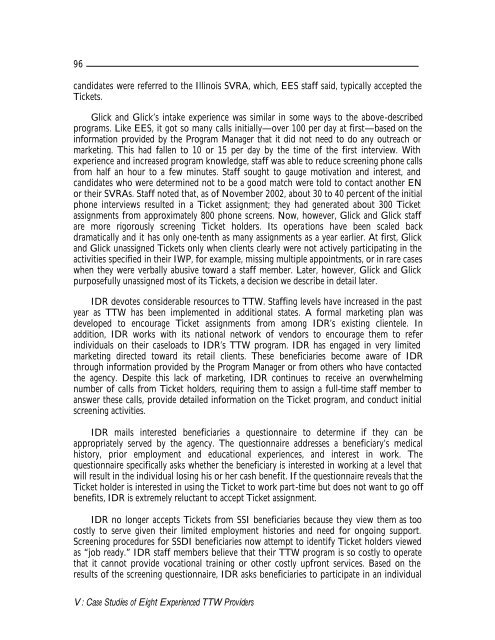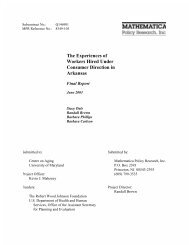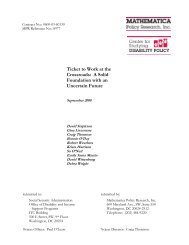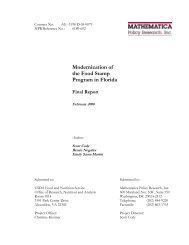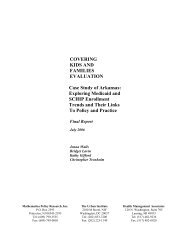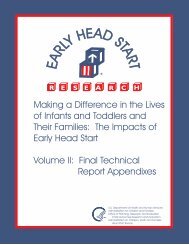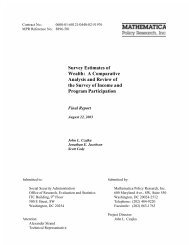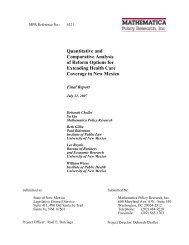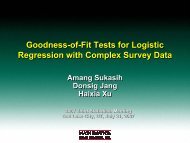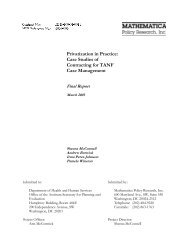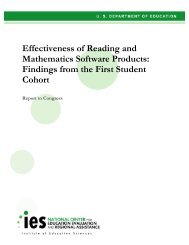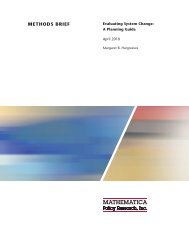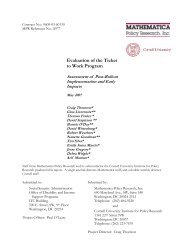Evaluation of the Ticket to Work Program Initial Evaluation Report
Evaluation of the Ticket to Work Program Initial Evaluation Report
Evaluation of the Ticket to Work Program Initial Evaluation Report
You also want an ePaper? Increase the reach of your titles
YUMPU automatically turns print PDFs into web optimized ePapers that Google loves.
96<br />
candidates were referred <strong>to</strong> <strong>the</strong> Illinois SVRA, which, EES staff said, typically accepted <strong>the</strong><br />
<strong>Ticket</strong>s.<br />
Glick and Glick’s intake experience was similar in some ways <strong>to</strong> <strong>the</strong> above-described<br />
programs. Like EES, it got so many calls initially—over 100 per day at first—based on <strong>the</strong><br />
information provided by <strong>the</strong> <strong>Program</strong> Manager that it did not need <strong>to</strong> do any outreach or<br />
marketing. This had fallen <strong>to</strong> 10 or 15 per day by <strong>the</strong> time <strong>of</strong> <strong>the</strong> first interview. With<br />
experience and increased program knowledge, staff was able <strong>to</strong> reduce screening phone calls<br />
from half an hour <strong>to</strong> a few minutes. Staff sought <strong>to</strong> gauge motivation and interest, and<br />
candidates who were determined not <strong>to</strong> be a good match were <strong>to</strong>ld <strong>to</strong> contact ano<strong>the</strong>r EN<br />
or <strong>the</strong>ir SVRAs. Staff noted that, as <strong>of</strong> November 2002, about 30 <strong>to</strong> 40 percent <strong>of</strong> <strong>the</strong> initial<br />
phone interviews resulted in a <strong>Ticket</strong> assignment; <strong>the</strong>y had generated about 300 <strong>Ticket</strong><br />
assignments from approximately 800 phone screens. Now, however, Glick and Glick staff<br />
are more rigorously screening <strong>Ticket</strong> holders. Its operations have been scaled back<br />
dramatically and it has only one-tenth as many assignments as a year earlier. At first, Glick<br />
and Glick unassigned <strong>Ticket</strong>s only when clients clearly were not actively participating in <strong>the</strong><br />
activities specified in <strong>the</strong>ir IWP, for example, missing multiple appointments, or in rare cases<br />
when <strong>the</strong>y were verbally abusive <strong>to</strong>ward a staff member. Later, however, Glick and Glick<br />
purposefully unassigned most <strong>of</strong> its <strong>Ticket</strong>s, a decision we describe in detail later.<br />
IDR devotes considerable resources <strong>to</strong> TTW. Staffing levels have increased in <strong>the</strong> past<br />
year as TTW has been implemented in additional states. A formal marketing plan was<br />
developed <strong>to</strong> encourage <strong>Ticket</strong> assignments from among IDR’s existing clientele. In<br />
addition, IDR works with its national network <strong>of</strong> vendors <strong>to</strong> encourage <strong>the</strong>m <strong>to</strong> refer<br />
individuals on <strong>the</strong>ir caseloads <strong>to</strong> IDR’s TTW program. IDR has engaged in very limited<br />
marketing directed <strong>to</strong>ward its retail clients. These beneficiaries become aware <strong>of</strong> IDR<br />
through information provided by <strong>the</strong> <strong>Program</strong> Manager or from o<strong>the</strong>rs who have contacted<br />
<strong>the</strong> agency. Despite this lack <strong>of</strong> marketing, IDR continues <strong>to</strong> receive an overwhelming<br />
number <strong>of</strong> calls from <strong>Ticket</strong> holders, requiring <strong>the</strong>m <strong>to</strong> assign a full-time staff member <strong>to</strong><br />
answer <strong>the</strong>se calls, provide detailed information on <strong>the</strong> <strong>Ticket</strong> program, and conduct initial<br />
screening activities.<br />
IDR mails interested beneficiaries a questionnaire <strong>to</strong> determine if <strong>the</strong>y can be<br />
appropriately served by <strong>the</strong> agency. The questionnaire addresses a beneficiary’s medical<br />
his<strong>to</strong>ry, prior employment and educational experiences, and interest in work. The<br />
questionnaire specifically asks whe<strong>the</strong>r <strong>the</strong> beneficiary is interested in working at a level that<br />
will result in <strong>the</strong> individual losing his or her cash benefit. If <strong>the</strong> questionnaire reveals that <strong>the</strong><br />
<strong>Ticket</strong> holder is interested in using <strong>the</strong> <strong>Ticket</strong> <strong>to</strong> work part-time but does not want <strong>to</strong> go <strong>of</strong>f<br />
benefits, IDR is extremely reluctant <strong>to</strong> accept <strong>Ticket</strong> assignment.<br />
IDR no longer accepts <strong>Ticket</strong>s from SSI beneficiaries because <strong>the</strong>y view <strong>the</strong>m as <strong>to</strong>o<br />
costly <strong>to</strong> serve given <strong>the</strong>ir limited employment his<strong>to</strong>ries and need for ongoing support.<br />
Screening procedures for SSDI beneficiaries now attempt <strong>to</strong> identify <strong>Ticket</strong> holders viewed<br />
as “job ready.” IDR staff members believe that <strong>the</strong>ir TTW program is so costly <strong>to</strong> operate<br />
that it cannot provide vocational training or o<strong>the</strong>r costly upfront services. Based on <strong>the</strong><br />
results <strong>of</strong> <strong>the</strong> screening questionnaire, IDR asks beneficiaries <strong>to</strong> participate in an individual<br />
V: Case Studies <strong>of</strong> Eight Experienced TTW Providers


